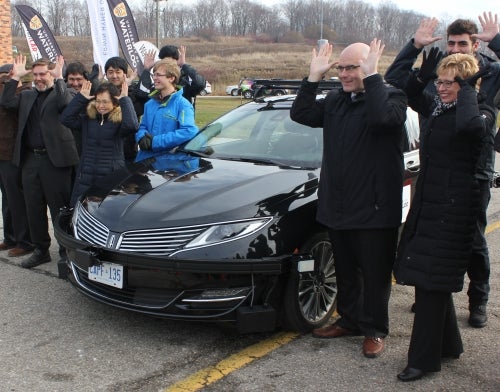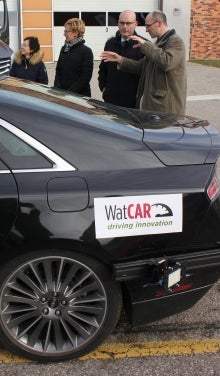Dignitaries pulled up to the podium in a high-tech car nicknamed Autonomoose today as the University of Waterloo was announced as one of the first three participants in a pilot program to test automated vehicles on Ontario roads.

(l-r) Joel Adams of the Erwin Hymer Group, Pearl Sullivan, Dean of Waterloo Engineering, Ontario Transportation Minister Steven Del Duca and Kitchener-Centre MPP Daiene Vernile playfully join in making moose antlers as they pose with Autonomoose, the automated car to be tested by a University of Waterloo team.
“Today, I think we begin to write the future of a made-in-Ontario success story,” said Steven Del Duca, the Minister of Transportation, who noted the car was effectively driving itself when they arrived.
A team of researchers from Waterloo won approval to test the Lincoln MKZ hybrid sedan on all public roadways in the province as part of a three-year effort to bring fully autonomous vehicles much closer to reality.
Progressively adding automated features to the Autonomoose test car will involve seven professors from three Waterloo Engineering departments, as well as two colleagues from the Cheriton School of Computer Science, working under the umbrella of the Waterloo Centre for Automotive Research (WatCAR).
“It is truly a collaborative effort,” said Pearl Sullivan, dean of the Faculty of Engineering.
Also approved for the testing program, which requires a licensed driver behind the wheel at all times, were the Erwin Hymer Group, which manufactures Roadtrek motorhomes in Kitchener, and BlackBerry QNX, a global software developer.
“Having vehicles out on the road is going to be what takes innovation really, truly to the next level, beyond the research phase and into the hands of consumers,” said Joel Adams of the Erwin Hymer Group, which will do testing with a large Mercedes-Benz van.
The Waterloo test car includes technologies such as radar, sonar and lidar, plus both inertial and vision sensors. It is fully connected to the Internet and features powerful computers to process and analyze data.
Advanced features to be added

It already has automated features such as adaptive cruise control to maintain a safe distance from other vehicles without driver intervention. By the end of the three-year project, researchers hope to have added several more advanced features.
Specific research areas include improving automated driving in all kinds of Canadian weather, optimizing fuel efficiency to reduce emissions and designing new computer-based controls.
Ontario is the first province with a testing program on public roads and Del Duca said more participants may be approved “in relatively short order” as the province positions itself at the forefront of the development of automated and, eventually, fully autonomous vehicles.
Professor Krzysztof Czarnecki (right), co-lead on the Autonomoose project, explains a point to Ontario Transportation Minister Steven Del Duca.
'Importance of innovation' can't be overstated
“Getting these vehicles onto the road, starting the testing, was crucial for us to demonstrate that we are leading here in the Province of Ontario,” he told a media conference at the Waterloo Region Emergency Fire Training and Research Centre, which has a test track used by the Waterloo research team.
“We will continue to innovate, to invest and to explore opportunities in automated and connected vehicle technologies because in today’s world of emerging technology and shifting demand, the importance of innovation and getting it right cannot be overstated.”
Daiene Vernile, MPP for Kitchener-Centre and parliamentary assistant to Del Duca, cited a forecast by the Institute of Electrical and Electronics Engineers that autonomous vehicles will account for 75 per cent of all vehicles on the road by 2040.
“This is the future,” she said. “Welcome to the future.”